Filter by
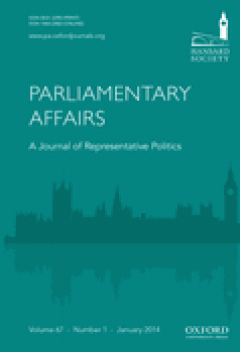
Introduction: Are British Ethnic Minorities Politically Under-represented?
Obama's 2008 presidential victory in the USA triggered a debate in Europe and the UK as to whether someone from an ethnic minority could achieve similar success in national politics. The 2010 General Election saw a small increase in ethnic minority candidates, but a near doubling of the number of black and Asian members of parliament (MPs) in the House of Commons. During 2010 and 2011, the Univ…
- Edition
- Volume 66 Issue 2 April 2013, p. 235-245
- ISBN/ISSN
- 0031-2290
- Collation
- -
- Series Title
- Parliamentary Affairs
- Call Number
- -

The Expatriate Vote in the French Presidential and Legislative Elections of 2…
In the 2012 legislative elections, 11 new deputies were elected representing newly created constituencies for the French expatriate community. The Right-wing Union pour un Mouvement Populaire (UMP) that initiated this legislation expected to create a clutch of safe seats for its own party, because expatriate voters have, since extra-territorial voting was introduced in 1981, always given massiv…
- Edition
- Volume 66 Issue 1 January 2013 , p. 213-233
- ISBN/ISSN
- 0031-2290
- Collation
- -
- Series Title
- Parliamentary Affairs
- Call Number
- -

Towards Parity Democracy? Gender in the 2012 French Legislative Elections
The victory of the Left in 2012, and the application of reinforced parity legislation, led to significant gains for women in French politics, with 27% women in parliament and 50% in government, including a powerful Women's Minister. However, a poor performance by the Right, and the concentration of women in less powerful positions, indicate that the battle for equality is not yet won. S�gol�ne …
- Edition
- Volume 66 Issue 1 January 2013 , p. 197-212
- ISBN/ISSN
- 0031-2290
- Collation
- -
- Series Title
- Parliamentary Affairs
- Call Number
- -

Marine Le Pen and the ‘New’ FN: A Change of Style or of Substance?
The electoral challenge of the far right is an enduringly problematic feature of contemporary French politics. In the first rounds of the 2012 presidential and parliamentary elections, the Front National (FN) under new leader Marine Le Pen attracted a combined total of ten million votes, bringing its ultra-nationalist policies to the centre of national political debate. This article examines th…
- Edition
- Volume 66 Issue 1 January 2013 , p. 179-196
- ISBN/ISSN
- 0031-2290
- Collation
- -
- Series Title
- Parliamentary Affairs
- Call Number
- -

From Jean-Marie to Marine Le Pen: Electoral Change on the Far Right
In the first round of the 2012 French presidential election, Marine Le Pen drew a record score of 17.9% of the valid votes. Her success was attributed to the �de-demonization� strategy she implemented to soften the party�s image, make it credible on other issues than immigration, and diversify its electoral audience. Survey data from 1988 to 2012 show a more complex picture. Marine Le Pen�s sup…
- Edition
- Volume 66 Issue 1 January 2013 , p.160-178
- ISBN/ISSN
- 0031-2290
- Collation
- -
- Series Title
- Parliamentary Affairs
- Call Number
- -

The Box Trumps the Net? Mediatising the 2012 Presidential Campaign
This article analyses and evaluates the role of the media in the 2012 presidential election. In particular, it focuses on campaign coverage by television and the internet from the perspective of both the main candidates' usage of the media (candidate communication) and the media's coverage of the campaign (political reportage and commentary). It argues that television, the dominant medium in th…
- Edition
- Volume 66 Issue 1 January 2013 ,p. 142-159
- ISBN/ISSN
- 0031-2290
- Collation
- -
- Series Title
- Parliamentary Affairs
- Call Number
- -

Everywhere and Nowhere: Europe and the World in the French 2012 Elections
European and global affairs are typically downplayed at election time in France, as elsewhere, and a rudimentary observation of the French 2012 presidential elections would appear to confirm this hypothesis. However, this article argues that in the case of the 2012 French elections the issues of �Europe� and �the world� were significant and inextricably linked to many of the ostensibly domestic…
- Edition
- Volume 66 Issue 1 January 2013 ,p. 124-141
- ISBN/ISSN
- 0031-2290
- Collation
- -
- Series Title
- Parliamentary Affairs
- Call Number
- -

Le Changement? French Socialism, the 2012 Presidential Election and the Polit…
This article analyses Hollande's presidential election campaign and victory of 2012, placing them in the historical, organisational and ideological context of French Socialism and the French party system. It argues that an effective campaign, an unpopular adversary and a French party system context unusually conducive to pooling the Left's electoral resources akin to 1981 all aided Hollande's c…
- Edition
- Volume 66 Issue 1 January 2013 p.106-123
- ISBN/ISSN
- 0031-2290
- Collation
- -
- Series Title
- Parliamentary Affairs
- Call Number
- -

Values and the Votes from Mitterrand to Hollande: The Rise of the Two-axis Po…
Like other European democracies, France appears to be moving towards a �new politics�. Cultural issues such as immigration and multiculturalism are now said to be more influential on voting behaviour than socioeconomic issues. In this paper we question the impact of values on the French presidential elections since 1988 and show that: (1) both new and old politics are playing a role; (2) this t…
- Edition
- Volume 66 Issue 1 January 2013 p. 69-86
- ISBN/ISSN
- 0031-2290
- Collation
- -
- Series Title
- Parliamentary Affairs
- Call Number
- -

Redistribution, Tax Policy and the Vote: The 2012 French Presidential Election
As tax policy is one of the most prominent issues for France at a time of great economic crisis and public debt, this article analyses how redistribution has been viewed and considered by voters. Assuming three main hypotheses about attitudes towards redistribution (egotropic perspective, sociotropic perspective and voter incompetence), we propose a series of empirical tests of these various ex…
- Edition
- Volume 66 Issue 1 January 2013 p. 87-105
- ISBN/ISSN
- 0031-2290
- Collation
- -
- Series Title
- Parliamentary Affairs
- Call Number
- -

French Election Theory: Why Sarkozy Lost
We review theories of French elections, drawing on a recent general theory developed in our analysis of presidential elections (1988�2007). We offer an explanation for why President Sarkozy was not re-elected in 2012. Two key theoretical variables were involved: one long term�ideological identification�and one short term�economic evaluation. The effect of these variables changed greatly from 20…
- Edition
- Volume 66 Issue 1 January 2013 p. 52-68
- ISBN/ISSN
- 0031-2290
- Collation
- -
- Series Title
- Parliamentary Affairs
- Call Number
- -

A Paradoxical Presidency: Nicolas Sarkozy, 2007–2012
The Sarkozy presidency is shot through with paradox and contrast. Sarkozy was a well-elected president swiftly loathed by most voters; a �hyperpresident� who probably weakened the office; a talented party leader who lost effective control of his party; a right-wing president who was readily compared with Tony Blair; and an ambitious reformer who promised a clean break with the indecision of his…
- Edition
- Volume 66 Issue 1 January 2013 p. 33-51
- ISBN/ISSN
- 0031-2290
- Collation
- -
- Series Title
- Parliamentary Affairs
- Call Number
- -

Politics as Normal? The 2012 French Presidential Election
This article proposes a framework based on three levels of analysis for understanding the 2012 presidential election: the institutional, the partisan and the situational. The 2012 election confirmed the bipolar institutional incentives that structure political competition in the Fifth Republic. The partisan dimension, however, was more fluid than this bipolar reading would lead one to expect. T…
- Edition
- Volume 66 Issue 1 January 2013 p. 17-32
- ISBN/ISSN
- 0031-2290
- Collation
- -
- Series Title
- Parliamentary Affairs
- Call Number
- -

France's Left Turn: Mapping the 2012 Elections
In 2012 the Socialist Party (PS) presidential candidate, Fran�ois Hollande, defeated the incumbent, Nicolas Sarkozy. The victory was convincing, though not overwhelming. Hollande thus became only the second Socialist president of the Fifth Republic after Fran�ois Mitterrand. Hollande's success in the presidential contest was reinforced a few weeks later when the PS and immediate allies won an a…
- Edition
- Volume 66 Issue 1 January 2013 p. 1-16
- ISBN/ISSN
- 0031-2290
- Collation
- -
- Series Title
- Parliamentary Affairs
- Call Number
- -

Parliamentary Affairs, Volume 66, Nomor 1 january 2013
- Edition
- -
- ISBN/ISSN
- 0031-2290
- Collation
- -
- Series Title
- -
- Call Number
- -
- Edition
- -
- ISBN/ISSN
- 0031-2290
- Collation
- -
- Series Title
- -
- Call Number
- -

Parliamentary Affairs, Volume 66, Nomor 2 April 2013
- Edition
- -
- ISBN/ISSN
- 0031-2290
- Collation
- -
- Series Title
- -
- Call Number
- -
- Edition
- -
- ISBN/ISSN
- 0031-2290
- Collation
- -
- Series Title
- -
- Call Number
- -
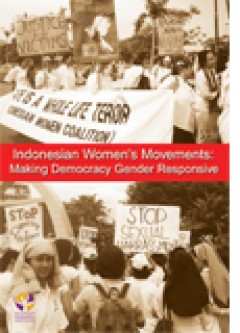
Indonesian Women’s Movements: Making Democracy Gender Responsive
This book is based on Women Research Institute�s study on �Feminist Leadership in the Post Authoritarian Regime in Indonesia: Its Impact on Social Movements and Women�s Welfare� (2012). The goal of the research was to capture the landscape of women�s leadership in Indonesia after the downfall of Suharto in 1998. There were not many studies and analysis on the condition of Indonesian women in t…
- Edition
- 1st ed.
- ISBN/ISSN
- 978-602-9230-03-1
- Collation
- xiii, 192p,; 22 cm
- Series Title
- -
- Call Number
- 305.4 ANA i
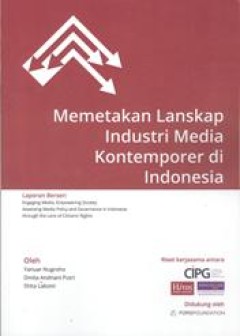
Memetakan Lanskap Industri Media Kontemporer di Indonesia
Buku ini merupakan hasil penelitian yang diterjemahkan dari versi aslinya berbahasa Inggris. Tujuan penelitian ini adalah untuk secara empiris mengkaji dinamika perkembangan industry media di Indonesia dan bagaimana dinamika-dinamika ini mementukan cara masyarakat sipil dan kelompok-kelompok warga Negara menggunakan haknya dalam bermedia. Penelitian ini bertujuan juga untuk memotret lanskap pe…
- Edition
- -
- ISBN/ISSN
- -
- Collation
- xiv, 163p.; 25 cm
- Series Title
- Laporan berseri: Engaging media, empowering society: assesing media policy and governance in Indonesia through the lens of citizens' rights
- Call Number
- 323.44 NUG m
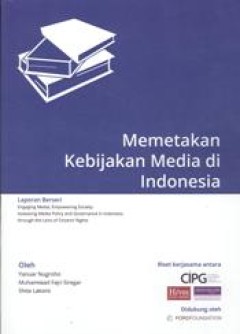
Memetakan Kebijakan Media di Indonesia
Buku ini merupakan hasil penelitian yang diterjemahkan dari versi aslinya berbahasa Inggris. Tujuan penelitian ini adalah untuk menelaah kebijakan media di Indonesia dan mengkaji dampaknya terhadap berbagai bentuk media dan warga negara serta hak-haknya, terutama yang berkaitan dengan hak mereka atas media. Dalam penelitian ini, hak semacam itu mengacu pada hak untuk mengakses media, mengakses…
- Edition
- -
- ISBN/ISSN
- -
- Collation
- xii, 153p.; 25 cm
- Series Title
- Laporan berseri: Engaging media, empowering society: assesing media policy and governance in Indonesia through the lens of citizens' rights
- Call Number
- 323.44 NUG m
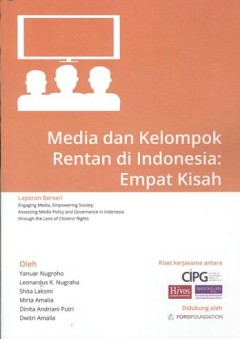
Media dan kelompok Rentan di Indonesia: empat kisah
Buku ini merupakan hasil penelitian yang diterjemahkan dari versi aslinya berbahasa Inggris. Tujuan penelitian ini adalah untuk memetakan (mengkaji) implikasi dinamika ekonomi politik media terhadap hak warga bermedia dilihat dari perspektif warga, terutama kelompok rentan dan dilemahkan. Dengan menyajikan empat studi kasus kelompok rentan, penetian ini bertujuan untuk memetakan gambar yang le…
- Edition
- -
- ISBN/ISSN
- -
- Collation
- xii, 139p.; 25 cm
- Series Title
- Laporan berseri: Engaging media, empowering society: assesing media policy and governance in Indonesia through the lens of citizens' rights
- Call Number
- 323.44 NUG m
 Computer Science, Information & General Works
Computer Science, Information & General Works  Philosophy & Psychology
Philosophy & Psychology  Religion
Religion  Social Sciences
Social Sciences  Language
Language  Pure Science
Pure Science  Applied Sciences
Applied Sciences  Art & Recreation
Art & Recreation  Literature
Literature  History & Geography
History & Geography